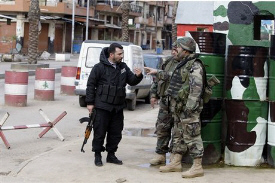Several areas in Lebanon are witnessing high tension with roads being cut and gunshots heard after the Lebanese army fired at a convoy of cars which declined to stop at an army checkpoint in the town of Alkwykhat in Akkar
Several areas in Lebanon are witnessing high tension with roads being cut and gunshots heard after the Lebanese army fired at a convoy of cars which declined to stop at an army checkpoint in the town of Alkwykhat in Akkar, which led to the killing of Sheikh Ahmed Abdul Wahid and one his bodyguards.
The National News agency said that "Sheikh Abdul Wahid, was heading with an armed convoy to the city of Halba in the Akkar district to participate in the ceremony which was held there against the regime in Syria," and pointed out that "upon the arrival of Sheikh Abdul Wahid's convoy at the army checkpoint, he was ordered to stop but declined to then the soldiers fired at the car what led to the death of Abdel Wahid and his bodyguard Mohammed Hussein Moreb."
Armed groups set fire to tyres to cut off several roads in North Lebanon in protest, including a road leading to Syria. Similar scenes were repeated across the Lebanese regions; in parts of Beirut, in the northern Akkar region and in the eastern Bekaa valley where angry protesters set tyres ablaze to cut off roads
Army and police were trying to re-open roads in an apparent bid to ease tension in the country.
Lebanese Prime Minister Najib Miqati appealed for calm as the army said it had opened an investigation. Miqati chaired a security meeting and later urged the Lebanese, particularly residents of Tripoli, to show restraint and "act wisely." PM Miqati stressed the need to reopen roads and not to attack private and public properties
